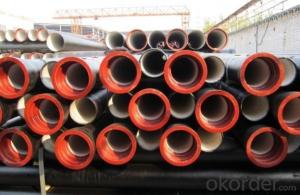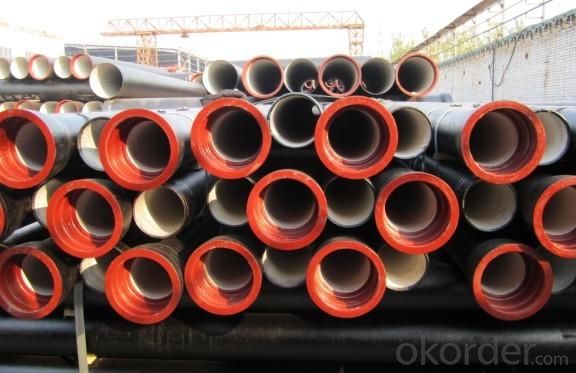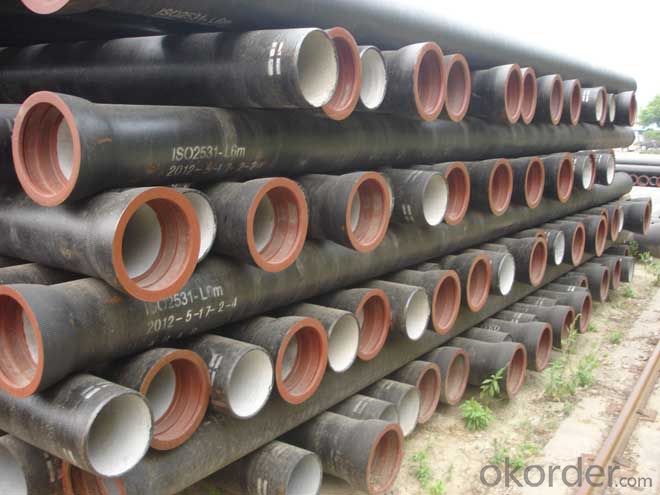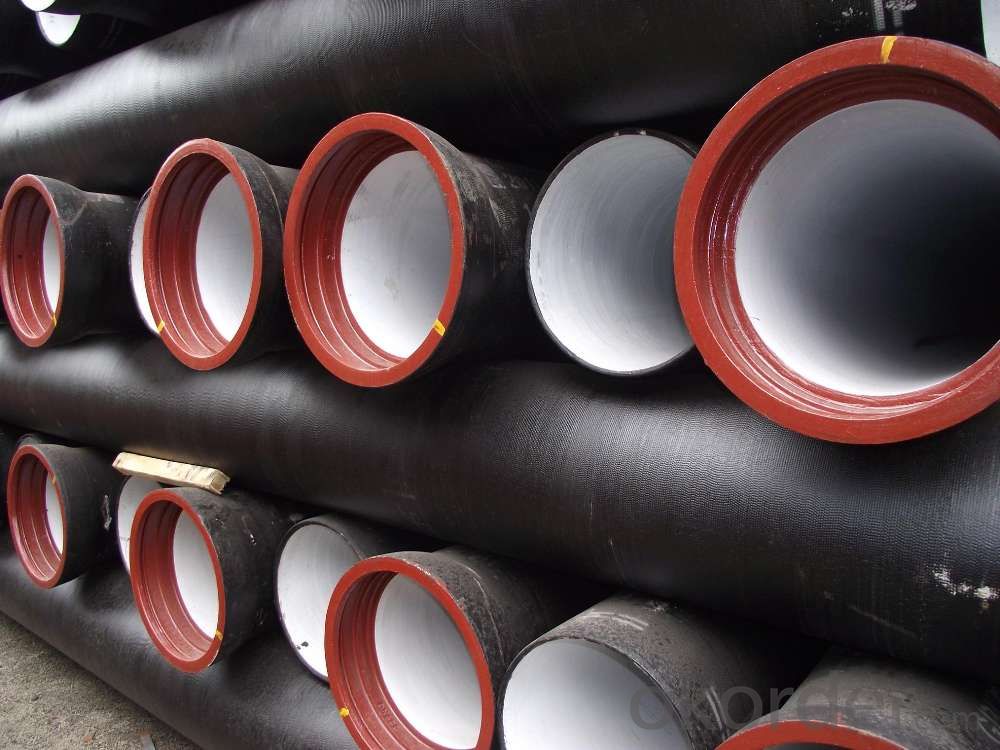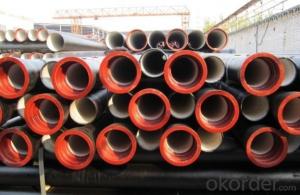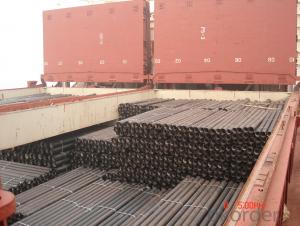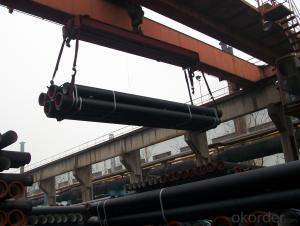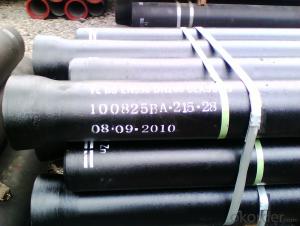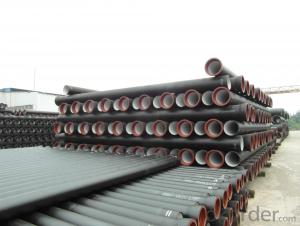Ductile Iron Pipe High Quality ISO2531:1998 DN80
- Loading Port:
- China main port
- Payment Terms:
- TT OR LC
- Min Order Qty:
- 999 m
- Supply Capability:
- 9999 m/month
OKorder Service Pledge
OKorder Financial Service
You Might Also Like
1,Ductile Iron Pipe Description :
1) Pipes confirm to ISO2531,K9 class,T type joint,6m long,with inside cements lining conform to ISO4179, outside Zinc spraying(130g/m2) and bitumen coating(70μm) conform to ISO8179.
2) Pipe ends: Spigot and socket ends, with 100% SBR rubber gaskets accoding to ISO4633
3) we can do third party inspection according to customer's request.
4) Our products have been sold to many international market, such as Middle East and South East Asia and Africa.
2,Main Features of the Ductile Iron Pipe:
•High yield strength
•High tensile Strength
•High corrosion resistance
•Pressure Resistence
•Satisfy the highest hygienic standards
3,Ductile Iron Pipe Images:
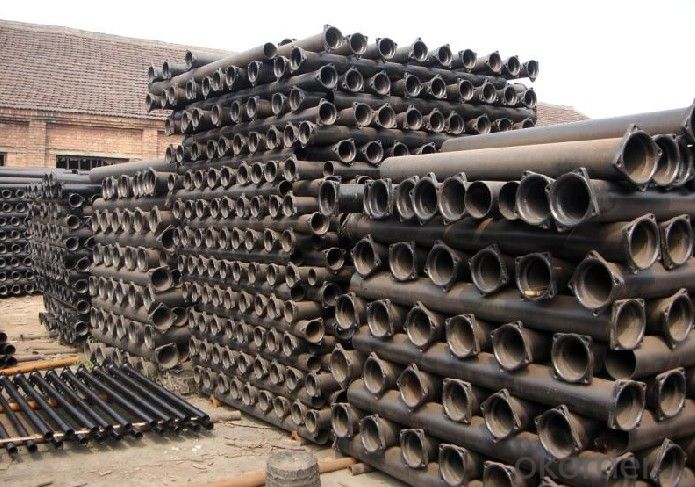
4.FAQ:
We have organized several common questions for our clients,may help you sincerely:
Q: Why would you choose ductile iron pipe rather than other pipe materials?
A:The reasons are obvious for that not only ductile iron pipe possesses the inherent strength and flexibility of ductile iron, combined with proven corrosion protection systems, but also the cost savings can be achieved from design to installation and commissioning.
Q:Why can you guarantee the inner of pipes can’t be corroded?
A: High alumina cement mortar lining and sulphate-resistant cement mortar lining. These two special linings are applicable to inner anti-corrosion for sewage pipes, improving resistance to erosion of the sewage components.
- Q: Are ductile iron pipes resistant to UV degradation?
- No, ductile iron pipes are not resistant to UV degradation.
- Q: Do ductile iron pipes require special handling during transportation?
- Yes, ductile iron pipes do require special handling during transportation. They are heavy and brittle, so they need to be loaded and unloaded carefully to prevent damage. Additionally, they should be properly secured and supported to avoid any bending or distortion during transit.
- Q: What is ductile iron pipe?
- Ductile iron pipe is a kind of cast iron pipe. In quality, the spheroidization of cast iron pipes is controlled to be 1-3 (spheroidization rate 80%), so the mechanical properties of the material have been better improved, with the nature of iron and the properties of steel. Ductile cast iron pipe after annealing, the microstructure is ferrite and pearlite, good mechanical properties, excellent corrosion resistance, good ductility, good sealing effect, simple installation, mainly for municipal, industrial and mining enterprises, water supply, gas, oil etc..
- Q: Can ductile iron pipes be recycled?
- Indeed, it is possible to recycle ductile iron pipes. Ductile iron, a form of cast iron, possesses exceptional strength and endurance, rendering it a favored selection for numerous purposes, such as water and sewage pipelines. Once these pipes have surpassed their useful lifespan, they can undergo recycling and be transformed into fresh merchandise. The recycling procedure comprises the fusion of the ductile iron pipes to extract the iron, subsequently serving as a raw material for the creation of novel ductile iron goods. By recycling ductile iron pipes, not only do we conserve natural resources, but we also diminish the environmental impact associated with mining and the production of new substances.
- Q: Are ductile iron pipes suitable for desalination plants?
- Yes, ductile iron pipes are suitable for desalination plants. Desalination plants typically require the transportation of large volumes of water, and ductile iron pipes offer several advantages that make them suitable for this purpose. Firstly, ductile iron pipes have excellent strength and durability, which is essential for withstanding the high pressure and corrosive nature of the desalinated water. They can handle the high flow rates and maintain structural integrity over long distances, ensuring a reliable and efficient water transport system. Additionally, ductile iron pipes have good resistance to corrosion, which is crucial in desalination plants where the water may contain high levels of salt and other minerals. The corrosion resistance properties of ductile iron pipes ensure that the water quality is not compromised and that the pipes have a long service life, reducing maintenance and replacement costs. Furthermore, ductile iron pipes have a high impact resistance, which is important in desalination plants where pipelines may be subjected to external forces or accidental damage. Their ability to withstand such impacts reduces the risk of leaks, ensuring the continuous and uninterrupted supply of water. Moreover, ductile iron pipes are also cost-effective compared to other pipe materials such as stainless steel or PVC. They have a lower initial cost and require less maintenance, making them a more economical choice for desalination plants. In conclusion, ductile iron pipes are indeed suitable for desalination plants due to their strength, durability, corrosion resistance, impact resistance, and cost-effectiveness. These pipes can effectively handle the demanding requirements of desalination plants, providing a reliable and efficient water transport system.
- Q: Are ductile iron pipes suitable for wastewater systems?
- Yes, ductile iron pipes are suitable for wastewater systems. They have high strength, durability, and corrosion resistance, making them ideal for handling the demanding conditions and harsh environment typically found in wastewater systems. Additionally, ductile iron pipes have good joint integrity, which ensures leak-free connections and minimizes maintenance requirements in wastewater applications.
- Q: Can ductile iron pipes be used in oil or gas transmission pipelines?
- Ductile iron pipes are applicable for oil or gas transmission pipelines. They belong to the cast iron category and possess enhanced characteristics, including increased tensile strength and ductility. These properties make them suitable for various applications, including pipeline systems used in oil and gas transmission. The corrosion resistance of ductile iron pipes is exceptional, which is crucial for pipelines that transport oil or gas over long distances. This material exhibits a high resistance to external factors such as soil chemicals, moisture, and corrosive gases commonly found in the oil and gas industry. Moreover, ductile iron pipes can endure high pressures and temperatures, making them suitable for the demanding requirements of oil and gas transmission. Moreover, ductile iron pipes have excellent impact resistance, enabling them to absorb and withstand external forces such as ground movement or heavy loads. This durability ensures the integrity and longevity of the pipeline system, minimizing the risk of leaks or failures. In summary, ductile iron pipes provide a reliable and cost-effective solution for oil and gas transmission pipelines. Their robustness, corrosion resistance, and ability to withstand high pressures and temperatures make them a viable choice for this critical infrastructure.
- Q: How do ductile iron pipes handle ground settlement due to construction activities?
- Ductile iron pipes have the ability to handle ground settlement caused by construction activities due to their flexibility and strength. These pipes are designed to withstand external pressure and can accommodate minor ground movements without significant damage or failure. The ductility of the material allows the pipes to deform slightly, absorbing the ground settlement and preventing them from cracking or breaking. Additionally, the joints in ductile iron pipes are typically flexible, allowing for further movement and reducing the risk of leakage or structural issues. Overall, ductile iron pipes are well-suited for withstanding ground settlement and ensuring the integrity of the pipeline system during construction activities.
- Q: Can ductile iron pipe be used for stormwater systems?
- Ductile iron pipe is indeed suitable for stormwater systems. This material is widely utilized in various applications, including stormwater systems, due to its strength and durability. Its exceptional corrosion resistance makes it ideal for managing stormwater, which frequently contains debris and chemicals. Moreover, ductile iron pipe possesses impressive tensile strength, enabling it to withstand significant amounts of pressure and weight. Therefore, it is a dependable option for stormwater systems that may encounter substantial flow rates and occasional surges. Furthermore, ductile iron pipe is accessible in a variety of sizes and configurations, providing flexibility and adaptability when designing stormwater systems.
- Q: How many casting methods are there in ductile iron casting? A 60*6 discus can not have sand holes. Its surface is smooth. What process can be used to make it?
- Is it better to use precoated sand, but only a little higher cost?.
Send your message to us
Ductile Iron Pipe High Quality ISO2531:1998 DN80
- Loading Port:
- China main port
- Payment Terms:
- TT OR LC
- Min Order Qty:
- 999 m
- Supply Capability:
- 9999 m/month
OKorder Service Pledge
OKorder Financial Service
Similar products
Hot products
Hot Searches
Related keywords
